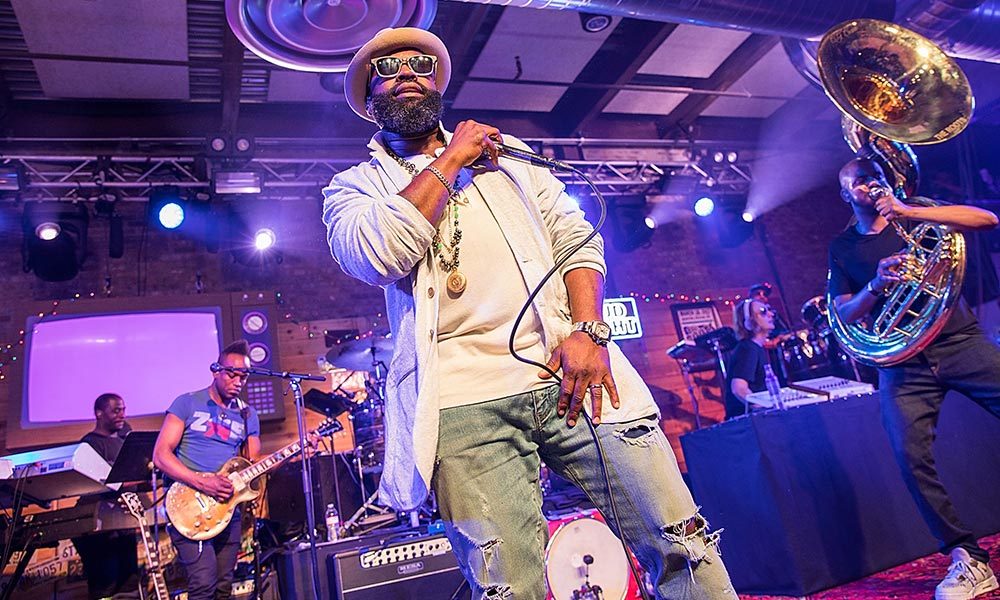The Roots
The Philadelphia hip-hop band founded by Questlove and Black Thought are renowned for their acclaimed albums and legendary live shows.

Though popular success has largely eluded the Roots, the Philadelphia group showed the way for live rap, building on Stetsasonic’s “Hip-Hop band” philosophy of the mid-’80s by focusing on live instrumentation at their concerts and in the studio. Though their album works have been inconsistent affairs, more intent on building grooves than pushing songs, the Roots’ live shows are among the best in the business.
The Roots’ focus on live music began back in 1987 when rapper Black Thought (Tariq Trotter) and drummer Questlove (Ahmir Khalib Thompson) became friends at the Philadelphia High School for Creative Performing Arts. Playing around the school, on the sidewalk, and later at talent shows (with Questlove’s drum kit backing Black Thought’s rhymes), the pair began to earn money and hooked up with bassist Hub (Leon Hubbard) and rapper Malik B. Moving from the street to local clubs, the Roots became a highly tipped underground act around Philadelphia and New York. When they were invited to represent stateside Hip-Hop at a concert in Germany, the Roots recorded an album to sell at shows; the result, Organix, was released in 1993 on Remedy Records. With a music industry buzz surrounding their activities, the Roots entertained offers from several labels before signing with DGC that same year.
The Roots’ first major-label album, Do You Want More?!!!??!, was released in January 1995; forsaking usual Hip-Hop protocol, the album was produced without any samples or previously recorded material. It peaked just outside the Top 100 but was mostly ignored by fans of Hip-Hop. Instead, Do You Want More?!!!??! made more tracks in alternative circles, partly due to the Roots playing the second stage at Lollapalooza that summer.
The band also journeyed to the Montreux Jazz Festival in Switzerland. Two of the guests on the album who had toured around with the band, human beatbox Rahzel the Godfather of Noyze — previously a performer with Grandmaster Flash and LL Cool J — and Scott Storch (later Kamal), became permanent members of the group.
Early in 1996, the Roots released ‘Clones’, the trailer single for their second album. It hit the rap Top Five and created a good buzz for the album. The following September, Illadelph Halflife appeared and made number 21 on the album charts. Much like its predecessor, though, the Roots’ second LP was a difficult listen. It made several very small concessions to mainstream rap — the bandmembers sampled material that they had recorded earlier at jam sessions — but failed to make a hit of their unique sound. the Roots’ third album, 1999’s Things Fall Apart, was easily their biggest critical and commercial success; The Roots Come Alive followed later that year.
The long-awaited Phrenology was released in late November 2002 amid rumours of the Roots losing interest in their label arrangements with MCA. In 2004, the band remedied the situation by creating the Okayplayer company. Named after their website, Okayplayer included a record label and a production/promotion company. The same year, the band held a series of jam sessions to give their next album a looser feel. The results were edited down to ten tracks and released as The Tipping Point in July of 2004.
A 2004 concert from Manhattan’s Webster Hall with special guests like Mobb Deep, Young Gunz, and Jean Grae was released in early 2005 as The Roots Present in both CD and DVD formats. Two volumes of the rarities-collecting Home Grown! The Beginner’s Guide to Understanding the Roots appeared at the end of the year.
A subsequent deal with Def Jam fostered a series of riveting, often grim sets, beginning with Game Theory (August 2006) and Rising Down (April 2008). In 2009, the group expanded its reach as the exceptionally versatile house band on Late Night with Jimmy Fallon. The new gig didn’t slow their recording schedule; in 2010 alone, they released the sharp How I Got Over (June), as well as Wake Up! (September), where they backed John Legend on covers of socially relevant soul classics like Harold Melvin & the Blue Notes’ ‘Wake Up Everybody’ and Donny Hathaway’s ‘Little Ghetto Boy’. The next year, as they remained with Fallon, the Roots worked with Miami soul legend Betty Wright on November’s Betty Wright: The Movie, and followed it weeks later with their 13th studio album, Undun.
Work on the group’s next studio album was postponed as an unexpected duet album with Elvis Costello took priority for the group in 2013. Originally planned as a reinterpretation of Costello’s songbook, the album Wise Up Ghost turned into a full-fledged collaboration and was greeted by positive reviews upon its September 2013 release on Blue Note.
Words: John Bush & Andy Kellman












